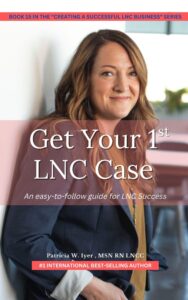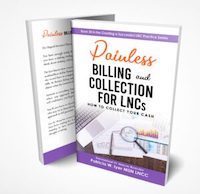Confidently Answer the Question “What Do You Charge”
“What do you charge?” The first time you are asked this question about your LNC fees, you can be caught off guard. One of the first principles is to be very clear when working with an attorney regarding fee agreements.
I’ve spent many hundreds of hours visiting clients and looking at their files while helping them with cases. This gave me first-hand evidence that attorneys, particularly plaintiff attorneys, have fee agreements in their records, and they’re usually in about a size six font to get the text on one page. They hand it to the plaintiff (who can’t read it without a magnifying glass) and say, “Here are the fees.” The attorney then goes over how they earn fees by handling a case.
If you’ve ever hired an attorney to represent you or something that has occurred in your life, you know that they’re never shy about sending invoices. They typically send detailed statements indicating what they’ve done and at what rate.
I emphasize this to reinforce that in dealing and negotiating with attorneys, you usually deal with people who can easily state their terms in dealing with clients. That’s called being professional, and they expect that professionalism from you. That’s why you need to learn to state your fees and terms confidently to make the difference between winning and losing a client.
“What Do You Charge?”
Imagine hearing this question. Does this question make you nervous? Does the topic of money make your mouth dry and your hands sweat? This is often an issue for LNCs handling their first case.
 For tips on getting your first case, get my book, Get Your First LNC Case: An Easy-to-Follow Guide to LNC Success. Go to http://LNC.tips/creatingseries.
For tips on getting your first case, get my book, Get Your First LNC Case: An Easy-to-Follow Guide to LNC Success. Go to http://LNC.tips/creatingseries.
Many LNCs feel uncomfortable when asserting their fees. Many small business owners have the same reaction. You’re not alone. Most of us have difficulty talking about money—especially when quoting prices for our work. But if you’re going to be successful in business, you must get over it.
It’s All About Your Mindset
You know your LNC skills help attorneys. You’ve seen it in their responses. You also understand that it costs money to make money. It costs money to run a business.
A business is just a hobby unless it makes you money.
You MUST charge a fair rate for your services, or else you will join other LNCs in a rush to the bottom of the fee schedule.
You cannot charge staff nurse rates and survive. When I hear of LNCs who charge $35-$50 an hour to get work, I know they will fail to be successful. You cannot cover your costs at that rate and show your inexperience and desperation by agreeing to work for those rates.
Yes, some companies will subcontract work to an LNC at those hourly rates. If you have little experience or overhead, you may temporarily agree to work at that low rate. Also, consider how to increase your compensation from other sources of LNC work.
Practice
The first rule for declaring your prices with confidence is to practice. Stand in front of your mirror and say in response to the question, “What do you charge?” Talk to yourself in the shower. Tell your cat your rates. “I charge $XXX per hour.” (Your cat won’t care.)
The more you say your rates out loud (not in your head), the more natural it will be for you.
Smile
Even if you’re on the phone or writing an email, smile when you say your rates, your tone of voice changes when you smile (as does the “tone” of your typing), and that tone can convey confidence and authority, not to mention professionalism.
Smiling conveys confidence. If you waiver when responding to the question, “What do you charge?” you will get your discomfort.
Be Confident
Listen to yourself as you speak to potential clients. Do you say things like, “Well, normally I charge…” or “Actually, my rates are…” or “Do you think that $XX/hour will work for you?”
These (and others like them) are all wishy-washy ways of talking that do not instill confidence in your client, and worse, they make you sound like you don’t believe in yourself.
Don’t be wishy-washy. It is an invitation to an attorney to negotiate your fees. Rather than squeaking out a timid, “Um, I charge, like, $125 an hour,” straighten your back and smile. Say, “My rate for LNC services is $125 an hour. I require a 10-hour retainer. Please make the check payable to LNC ABC Services Inc.”
And then…be silent. When we’re nervous or feeling intimidated, we tend to talk. We want to fill the silence to avoid having to sit there uncomfortably and wonder what the other person is thinking.
But guess what? They are just as uncomfortable with the silence, and psychologically, the one who speaks first is at a disadvantage. When you’re talking price, avoid the urge to fill the silence (mainly because you’re most likely to try to justify your pricing) and let your potential client take the time to respond.
I know someone who always carries a cigar when he makes sales calls. He uses it as a prop. After he quotes his rate, he shoves the cigar in his mouth to make himself stop talking.
You don’t need a cigar. Try this when an attorney asks you, “What do you charge?” When you quote your rate over the phone, cover your mouth with your hand to stop blurting out any comment that will fill the silence.
Will speaking with confidence always land you a new client? No. But being able to share your pricing in a clear voice when you are asked, “What do you charge?” will help potential clients know that you’re confident in your skills and, consequently, that you are the right LNC for them.
Fee Pressure
I wish no more needs to be said about rates and fees, but you will encounter bargain hunters (known in the car sales industry as tire kickers).
It’s happened to every legal nurse consultant at one time or another—probably more than once. You quote your hourly rates, only to have your potential client respond with, “That sounds great, but I can’t afford it. You charge THAT much? Can you lower your rates for me?”
What do you do? Should you lower your rates?
For many legal nurse consultants, their first response is to question whether they are charging too much. You ask, “Should I lower my rate? After all,” you reason, “he does need my help. Plus, it’s goodwill, and he will talk about me with his colleagues and refer business to me later.”
You need more attorneys who will try to reduce your rate. Or not hire you.
When you reduce your fees, more likely than not, you end up with a client who takes far too much of your time for less money than you deserve. You wind up resentful and wondering why you aren’t earning a living you know you’re capable of.
Make a List
In this list, identify how you feel about this price-lowering pressure.
- I feel anxious.
- I am uneasy.
- I feel like I need the work.
- I’m afraid of not getting clients.
- I’m afraid of being exploited.
Remember that how you feel about something doesn’t mean that’s how it is. Face your emotions, but don’t let them paralyze you. I mentioned that some LNCs charge $35-$50 an hour, a rate that will not allow them to stay in business. In some areas, that fee is LESS than staff nurse rates.
You don’t want to do that.
The last item on the list, however, is accurate. You’re right to fear being exploited because you will be if you cave in on your rates. Further, I address other ways to handle the rates issue that can become win-win situations, but these will only work if you take these three emotional issues.
- Write down what you’re worth and why.
- Begin with your hourly fee. “I charge $150 an hour, and I deserve it because . . .”
- Make that list and then study it. Read it out loud until you believe it. Take as long as you need.
Now, make another list.
Analyze how the tire kickers found you.
- Did a colleague recommend them?
- Does this colleague charge low rates?
- Is it a good idea to exercise caution about such referrals?
Ask yourself how you can get referrals from those LNCs and attorneys who charge healthy fees. Pursue these contacts.
You’re not only shifting your methods; you’re also shifting your mindset. When you are connected to people with sound ideas about prosperity, you learn to adopt their values.
You Can Make Concessions Without Lowering Your Rates
I am going to assume you are charging a competitive hourly rate. I want you to promise that you will never again lower your rates to appeal to a client right now. Doing so devalues your services, makes the client less likely to follow through, and makes you feel terrible later.
The attorney may take time to pay your bills by stringing your payments out so that you are perpetually owed money. The way to avoid this is to get replenishing retainers, a topic I will cover later.
The attorney getting you to lower your rate will also look for other ways to negotiate concessions from you.
Having different rates for different attorneys would become a bookkeeping nightmare forcing you to adjust rates when you invoice. Worse, attorneys talk and find out they are paying different rates than their colleagues. “What can’t I get the same deal she got?” they ask you.
Now, I’m not saying you can never offer special deals. But I do want you to change how those offers are made. Here’s how it works.
Your hourly rate is $150, for example. You can agree to this: Once you receive the records, you will give the attorney an estimate of how long you think it will take to complete the case. You can agree not to exceed X hours without her approval. Do not lower your rates so far that you feel used, but at the same time, you’ve worked with her to create a plan she can afford. It’s a true win-win for both of you.
The next time you’re asked to lower your rates for anything, consider how you can reduce the work you’ll be doing. That way, you’ll never feel like you’ve been taken advantage of, and your clients will still get excellent service.
Practical Advice for Asserting Your Fees
You should state your fees confidently and in a businesslike manner. You’re conveying your worth.
You also broadcast your worth when responding to an attorney who asks, “What does that hourly rate cover?” Again, be confident when you cover the details involved in the rate.
For example, in my LNC business, we charged a flat rate encompassing a specific service of locating an expert witness. Instead of saying we set a specific rate for finding an expert, we would tell the attorney the fee covered:
- Summarizing and organizing the medical records
- Preparing a summary
- Doing an extensive search for a board-certified expert in the specific geographic area and specialty
- Obtaining the physician’s CV
- Obtaining the physician’s fees
- Indexing the medical records and shipping the medical records to the expert
Doesn’t that sound more impressive than its “XXXX” dollars?
 By the time they heard all the details of the service when they had listened to the price, they would say, “Oh, that’s reasonable.” Enumerating what you do emphasizes your worth.
By the time they heard all the details of the service when they had listened to the price, they would say, “Oh, that’s reasonable.” Enumerating what you do emphasizes your worth.
Click here to get my book, “Painless Billing and Collections.” It will save you a great deal of headaches when you learn exactly how to set your fees.

Pat Iyer is president of The Pat Iyer Group, which develops resources to assist LNCs in obtaining more clients, making more money, and achieving their business goals and dreams.
Join our Facebook group, LNC Business Growth Circle, to be part of our LNC community.
Pat’s related websites include the continuing education provided on LNCEU.com, the podcasts broadcast at podcast.legalnursebusiness.com, and writing tips supplied at patiyer.com.
Get all of Pat’s content in one place by downloading the mobile app, Expert Edu at www.legalnursebusiness.com/expertedu. Watch videos, listen to podcasts, read blogs, watch online courses and training, and more.


